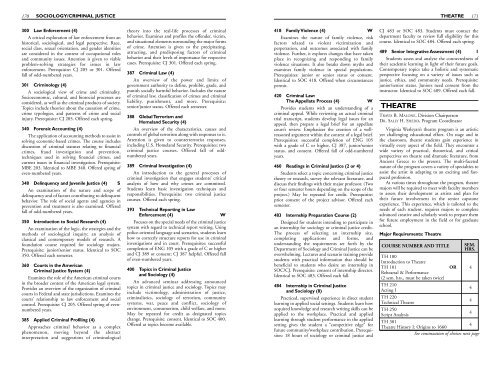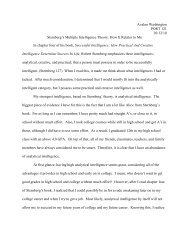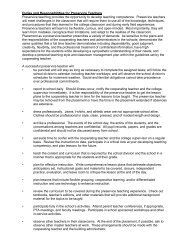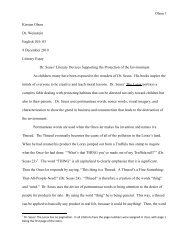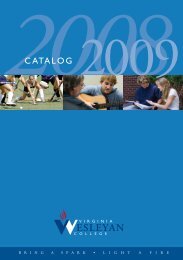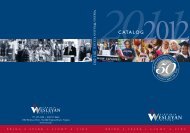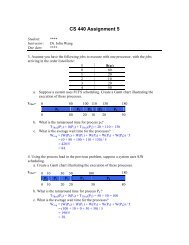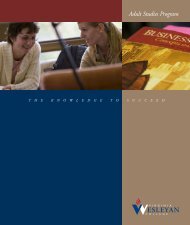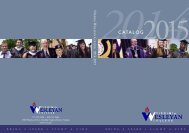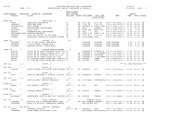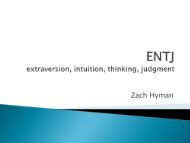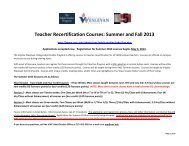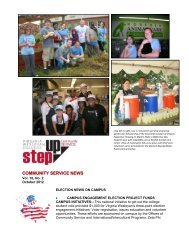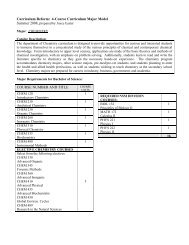2013-2014 Catalog - Virginia Wesleyan College
2013-2014 Catalog - Virginia Wesleyan College
2013-2014 Catalog - Virginia Wesleyan College
- No tags were found...
You also want an ePaper? Increase the reach of your titles
YUMPU automatically turns print PDFs into web optimized ePapers that Google loves.
170 SOCIOLOGY/CRIMINAL JUSTICETHEATRE171300 Law Enforcement (4)A critical exploration of law enforcement from anhistorical, sociological, and legal perspective. Race,social class, sexual orientation, and gender identitiesare considered in the context of occupational rolesand community issues. Attention is given to viableproblem-solving strategies for issues in lawenforcement. Prerequisite: CJ 205 or 301. Offeredfall of odd-numbered years.301 Criminology (4)A sociological view of crime and criminality.Socioeconomic, cultural, and biosocial processes areconsidered, as well as the criminal products of society.Topics include theories about the causation of crime,crime typologies, and patterns of crime and socialinjury. Prerequisite: CJ 205. Offered each spring.340 Forensic Accounting (4)The application of accounting methods to assist insolving economic-based crimes. The course includesdiscussion of criminal statutes relating to financialcrimes, fraud investigation and prevention,techniques used in solving financial crimes, andcurrent issues in financial investigation. Prerequisite:MBE 203. Identical to MBE 340. Offered spring ofeven-numbered years.348 Delinquency and Juvenile Justice (4) SAn examination of the nature and scope ofdelinquency and of factors contributing to delinquentbehavior. The role of social agents and agencies inprevention and treatment is also examined. Offeredfall of odd-numbered years.350 Introduction to Social Research (4)An examination of the logic, the strategies and themethods of sociological inquiry; an analysis ofclassical and contemporary models of research. Afoundation course required for sociology majors.Prerequisite: junior/senior status. Identical to SOC350. Offered each semester.360 Courts in the AmericanCriminal Justice System (4)Examines the role of the American criminal courtsin the broader context of the American legal system.Provides an overview of the organization of criminalcourts in Federal and state jurisdictions. Examines thecourts’ relationship to law enforcement and socialcontrol. Prerequisite: CJ 205. Offered spring of evennumberedyears.385 Applied Criminal Profiling (4)Approaches criminal behavior as a complexphenomenon, moving beyond the abstractinterpretation and suggestions of criminologicaltheory into the real-life processes of criminalbehavior. Examines and profiles the offender, victim,and situational elements surrounding the major formsof crime. Attention is given to the precipitating,attracting, and predisposing factors of criminalbehavior and their levels of importance for respectivecases. Prerequisite: CJ 301. Offered each spring.387 Criminal Law (4)An overview of the power and limits ofgovernment authority to define, prohibit, grade, andpunish socially harmful behavior. Includes the natureof criminal law, classification of crimes and criminalliability, punishment, and more. Prerequisite:senior/junior status. Offered each semester.388 Global Terrorism andHomeland Security (4)An overview of the characteristics, causes andcontrols of global terrorism along with responses to it.Attention is given to counterterrorist responses,including U.S. Homeland Security. Prerequisites: twocriminal justice courses. Offered fall of oddnumberedyears.389 Criminal Investigation (4)An introduction to the general processes ofcriminal investigation that engages students’ criticalanalysis of how and why crimes are committed.Students learn basic investigation techniques andresponsibilities. Prerequisite: two criminal justicecourses. Offered each spring.393 Technical Reporting in LawEnforcement (4)WFocuses on the special needs of the criminal justicesystem with regard to technical report writing. Usingpolice-oriented language and scenarios, students learnhow to correctly structure reports for use in criminalinvestigations and in court. Prerequisites: successfulcompletion of ENG 105 with a grade of C or higherand CJ 389 or consent; CJ 387 helpful. Offered fallof even-numbered years.400 Topics in Criminal Justiceand Sociology (4)An advanced seminar addressing announcedtopics in criminal justice and sociology. Topics mayinclude victimology, administration of justice,criminalistics, sociology of terrorism, communitysystems, war, peace and conflict, sociology ofenvironment, consumerism, child welfare, and more.May be repeated for credit as designated topicschange. Prerequisite: consent. Identical to SOC 400.Offered as topics become available.418 Family Violence (4) WExamines the nature of family violence, riskfactors related to violent victimization andperpetration, and outcomes associated with familyviolence. Further, it explores changes that have takenplace in recognizing and responding to familyviolence situations. It also breaks down myths andexamines family violence in special populations.Prerequisites: junior or senior status or consent.Identical to SOC 418. Offered when circumstancespermit.420 Criminal Law:The Appellate Process (4)WProvides students with an understanding of acriminal appeal. While reviewing an actual criminaltrial transcript, students develop legal issues for anappeal, then prepare a legal brief for an appellatecourt’s review. Emphasizes the creation of a wellreasonedargument within the context of a legal brief.Prerequisites: successful completion of ENG 105with a grade of C or higher, CJ 387, junior/seniorstatus, and consent. Offered fall of odd-numberedyears.460 Readings in Criminal Justice (2 or 4)Students select a topic concerning criminal justicetheory or research, survey the relevant literature, anddiscuss their findings with their major professor. (Twoor four semester hours depending on the scope of theproject.) May be repeated for credit. Prerequisite:prior consent of the project advisor. Offered eachsemester.483 Internship Preparation Course (2)Designed for students intending to participate inan internship for sociology or criminal justice credit.The process of selecting an internship site,completing applications and forms, andunderstanding the requirements set forth by theDepartment of Sociology and Criminal Justice can beoverwhelming. Lectures and scenario training providestudents with practical information that should bebeneficial to students who desire an internship inSOC/CJ. Prerequisite: consent of internship director.Identical to SOC 483. Offered each fall.484 Internship in Criminal Justiceand Sociology (8)Practiced, supervised experience in direct studentlearning in applied social settings. Students learn howacquired knowledge and research writing skills can beapplied to the workplace. Practical and appliedlearning through student performance in the appliedsetting gives the student a “competitive edge” forfuture community/workplace contribution. Prerequisites:18 hours of sociology or criminal justice andCJ 483 or SOC 483. Students must contact thedepartment faculty to review full eligibility for thiscourse. Identical to SOC 484. Offered each spring.489 Senior Integrative Assessment (4) IStudents assess and analyze the connectedness oftheir academic learning in light of their future goals.Contemporary topics take a holistic and systematicperspective focusing on a variety of issues such asjustice, ethics, and community needs. Prerequisite:junior/senior status. Juniors need consent from theinstructor. Identical to SOC 489. Offered each fall.THEATRETRAVIS B. MALONE, Division ChairpersonDR. SALLY H. SHEDD, Program Coordinator<strong>Virginia</strong> <strong>Wesleyan</strong>’s theatre program is an artisticyet challenging educational effort. On stage and inthe classroom, theatre students gain experience invirtually every aspect of the field. They encounter awide variety of practical, theoretical, and criticalperspectives on theatre and dramatic literature, fromAncient Greece to the present. The multi-facetednature of the program covers a variety of specialties toassist the artist in adapting to an exciting and fastpacedprofession.At various times throughout the program, theatremajors will be required to meet with faculty membersto assess their development as artists and plan fortheir future involvement in the senior capstoneexperience. This experience, which is tailored to theneeds of each student, requires majors to completeadvanced creative and scholarly work to prepare themfor future employment in the field or for graduateschool.Major Requirements: TheatreCOURSE NUMBER AND TITLESEM.HRS.TH 100Introduction to TheatreTH 101 OR 4Rehearsal & Performance(2 sem. hrs., must be taken twice)TH 210Acting I4TH 220Technical Theatre4TH 250Script Analysis4TH 301Theatre History I: Origins to 16604See continuation of choices next page


